2011.07.DD - Total Guitar - Double Vision (Slash)
Page 1 of 1
 2011.07.DD - Total Guitar - Double Vision (Slash)
2011.07.DD - Total Guitar - Double Vision (Slash)
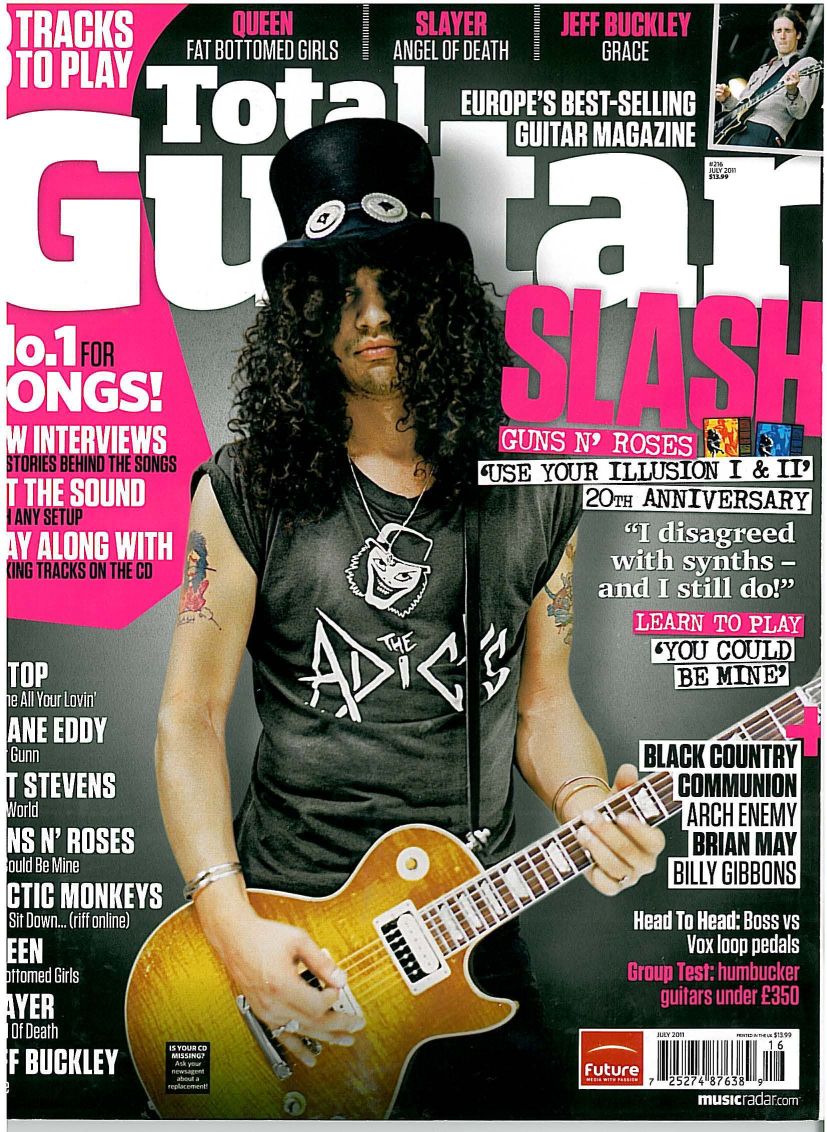

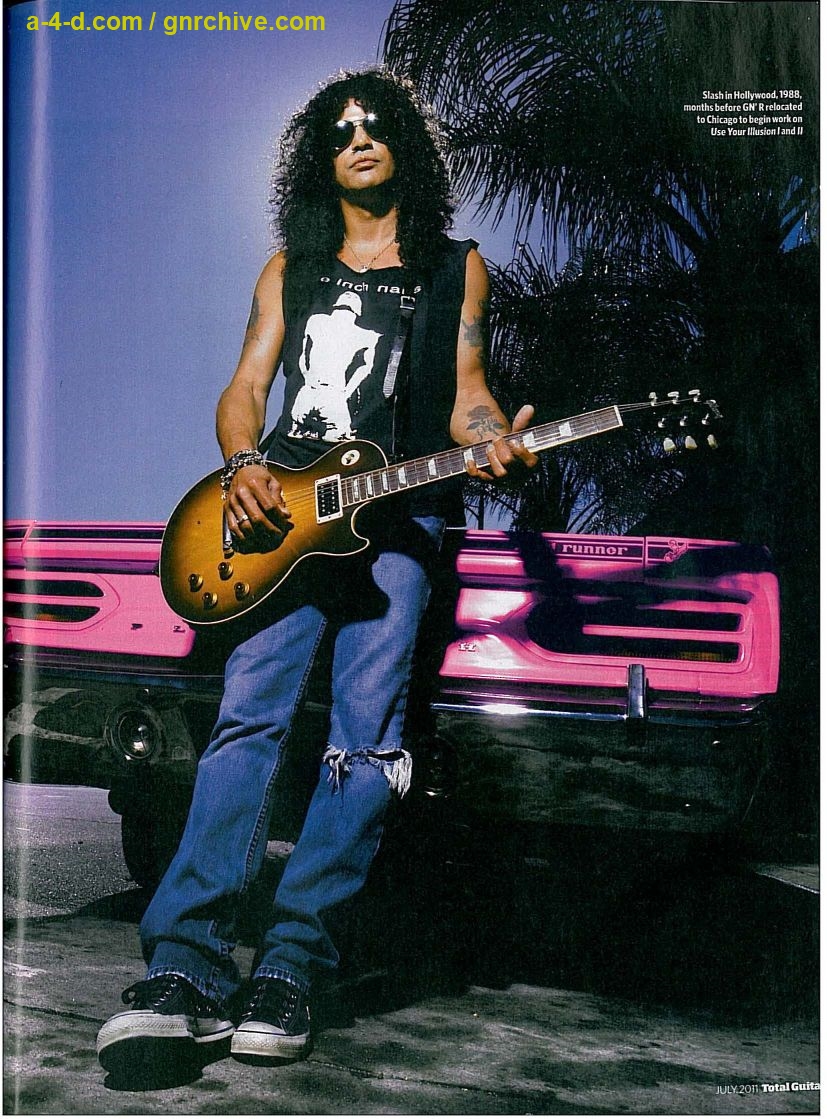
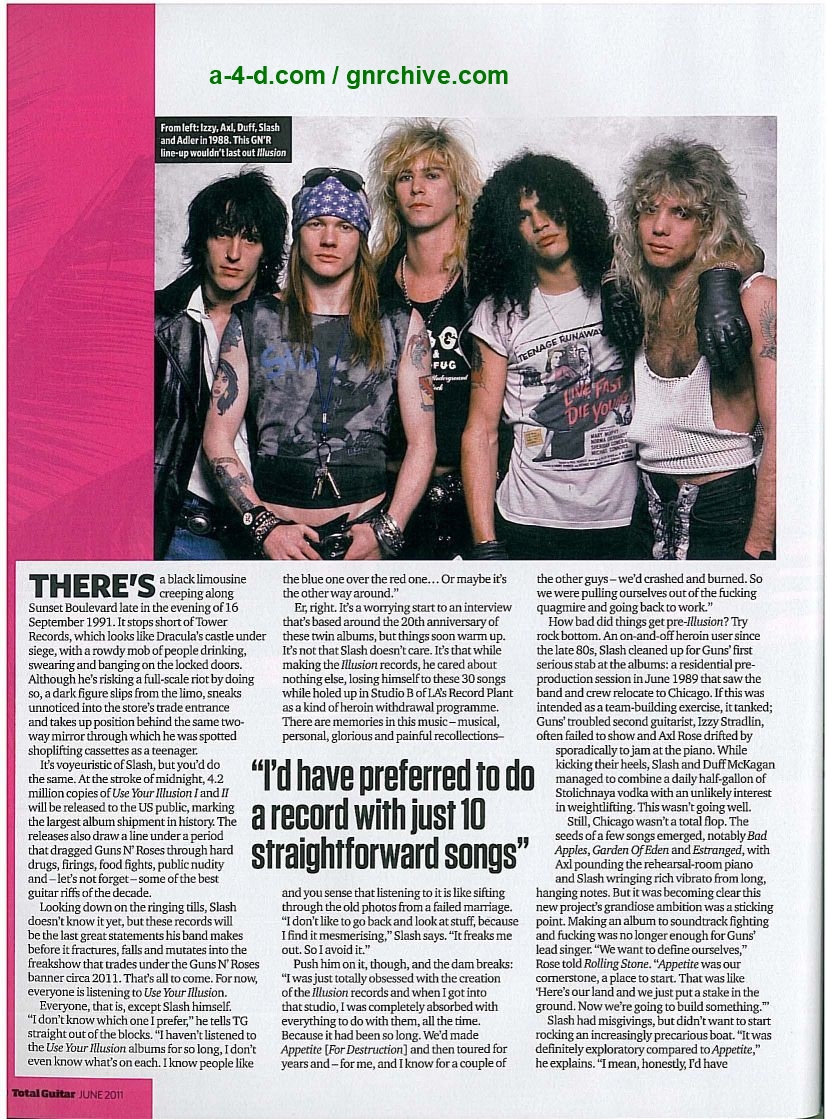
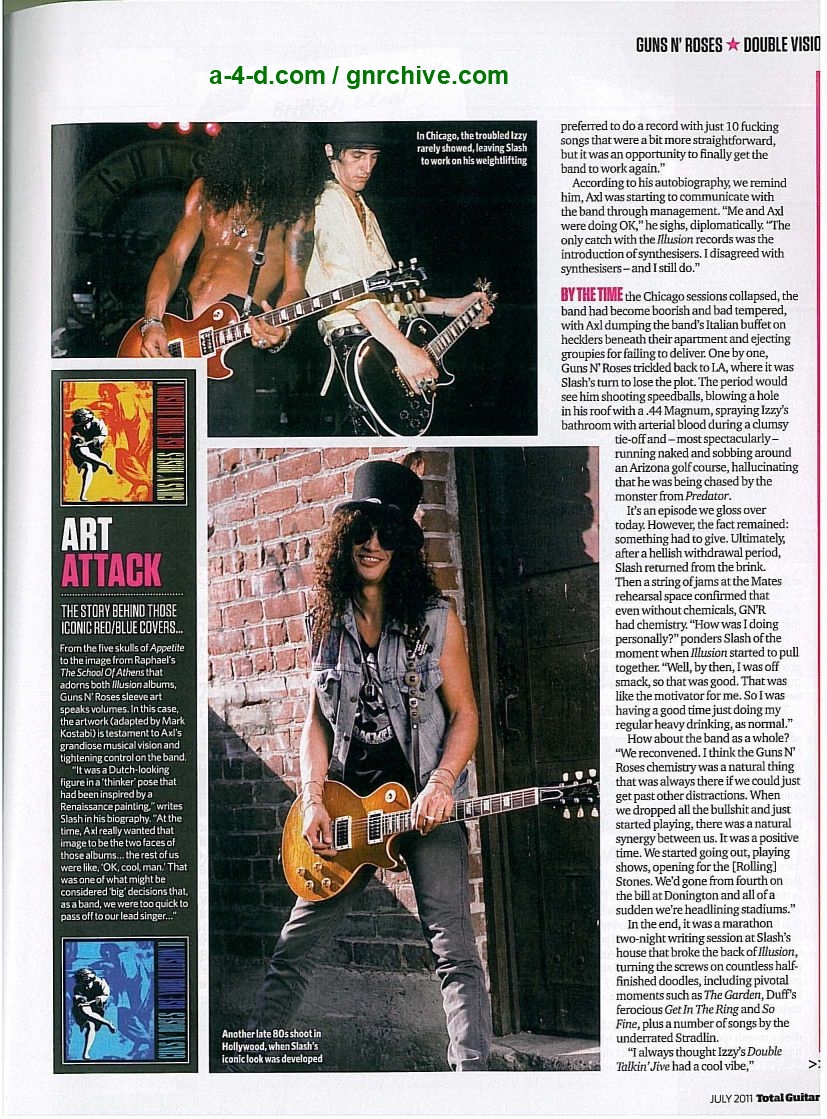
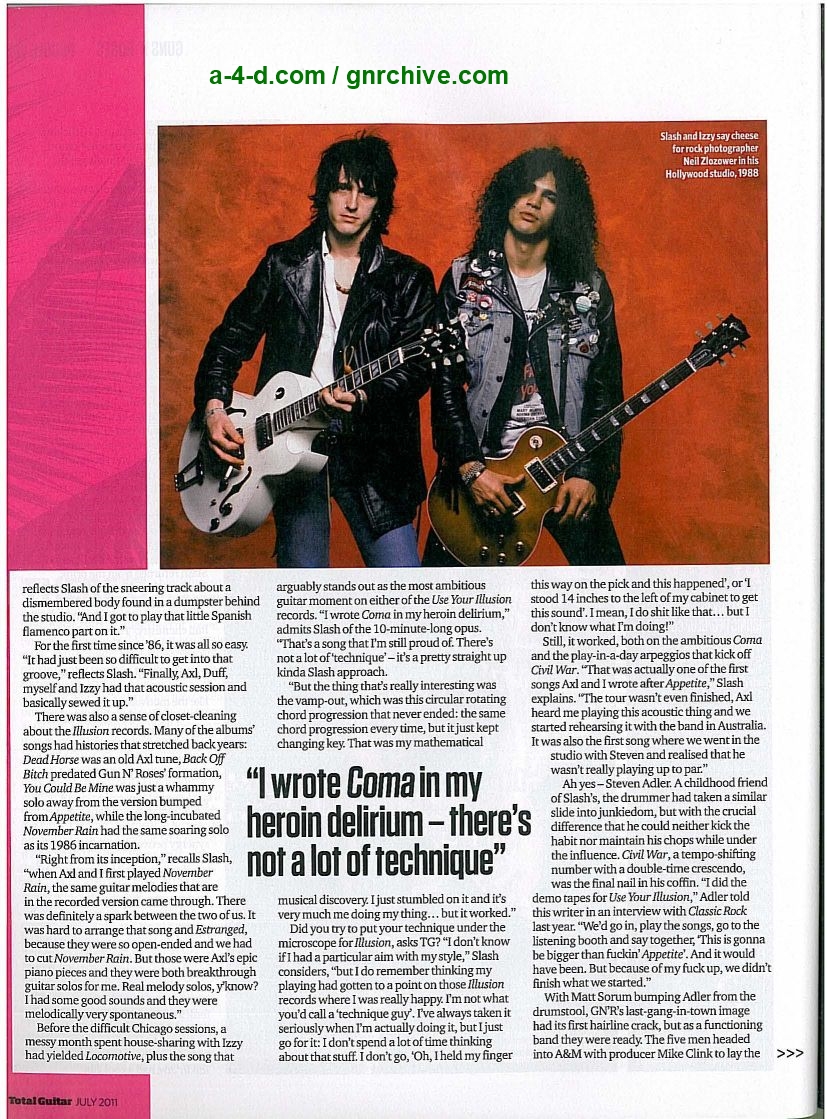

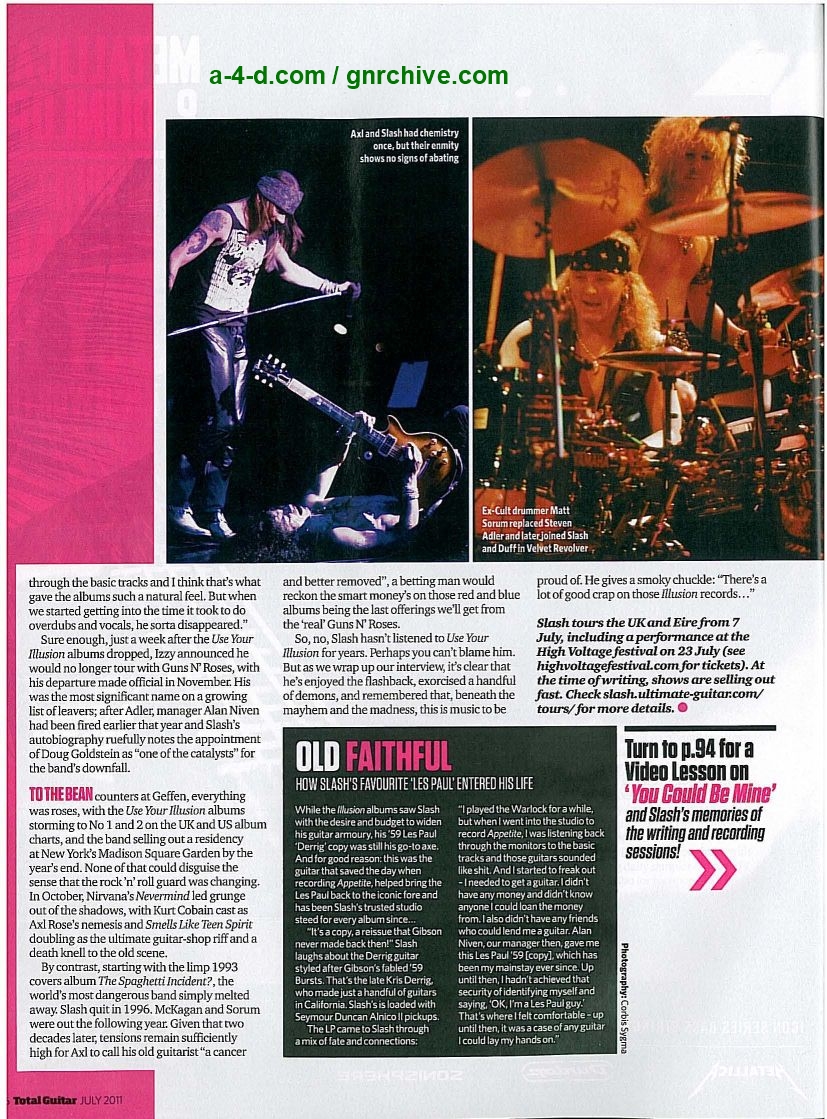
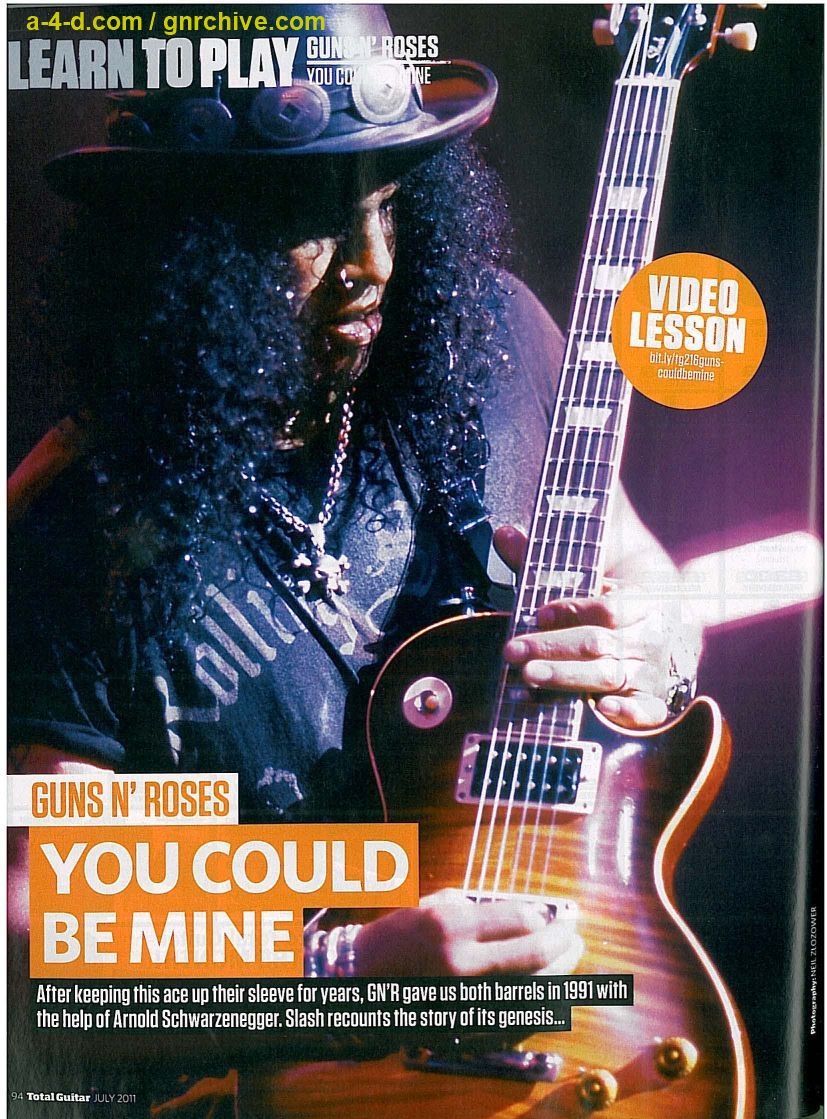

DOUBLE VISION
Words: Henry Yates
Photography: Neil Zlozower
By 1991, fans had waited years for a new Guns N’ Roses album, then two came along at once: Use Your Illusion I and II. With exclusive commentary from Slash, TG looks back at the riffs, drugs, nudity and food fights behind GN’R’s last stand…
There's a black limousine creeping along Sunset Boulevard late in the evening of 16 September 1991. It stops short of Tower Records, which looks like Dracula's castle under siege, with a rowdy mob of people drinking, swearing and banging on the locked doors. Although he's risking a full-scale riot by doing so, a dark figure slips from the limo, sneaks unnoticed into the store's trade entrance and takes up position behind the same two-way mirror through which he was spotted shoplifting cassettes as a teenager.
It's voyeuristic of Slash, but you'd do the same. At the stroke of midnight, 4.2 million copies of Use Your Illusion I and II will be released to the US public, marking the largest album shipment in history. The releases also draw a line under a period that dragged Guns N' Roses through hard drugs, firings, food fights, public nudity and - let's not forget - some of the best guitar riffs of the decade.
Looking down on the ringing tills, Slash doesn't know it yet, but these records will be the last great statements his band makes before it fractures, falls and mutates into the freakshow that trades under the Guns N' Roses banner circa 2011. That's all to come. For now, everyone is listening to Use Your Illusion.
Everyone, that is, except Slash himself. "I don't know which one I prefer," he tells TG straight out of the blocks. "I haven't listened to the Use Your Illusion albums for so long, I don't even know what's on each. I know people like the blue one over the red one… Or maybe it's the other way around."
Er, right. It's a worrying start to an interview that's based around the 20th anniversary of these twin albums, but things soon warm up. It's not that Slash doesn't care. It's that while making the Illusion records, he cared about nothing else, losing himself to these 30 songs while holed up in Studio B of LA's Record Plant as a kind of heroin withdrawal programme. There are memories in this music - musical, personal, glorious and painful recollections- and you sense that listening to it is like sifting through the old photos from a failed marriage. "I don't like to go back and look at stuff, because I find it mesmerising," Slash says. "It freaks me out. So I avoid it."
Push him on it, though, and the dam breaks: "I was just totally obsessed with the creation of the Illusion records and when I got into that studio, I was completely absorbed with everything to do with them, all the time. Because it had been so long. "We'd made Appetite [For Destruction] and then toured for years and - for me, and I know for a couple of the other guys - we'd crashed and burned. So we were pulling ourselves out of the fucking quagmire and going back to work."
How bad did things get pre-Illusion? Try rock bottom. An on-and-off heroin user since the late '80s, Slash cleaned up for Guns' first serious stab at the albums: a residential preproduction session in June 1989 that saw the band and crew relocate to Chicago. If this was intended as a team-building exercise, it tanked; Guns' troubled second guitarist, Izzy Stradlin, often failed to show and Axl Rose drifted by sporadically to jam at the piano. While kicking their heels, Slash and Duff McKagan managed to combine a daily half-gallon of Stolichnaya vodka with an unlikely interest in weightlifting. This wasn't going well.
Still, Chicago wasn't a total flop. The seeds of a few songs emerged, notably Bad Apples, Garden Of Eden and Estranged, with Axl pounding the rehearsal-room piano and Slash wringing rich vibrato from long, hanging notes. But it was becoming clear this new project's grandiose ambition was a sticking point. Making an album to soundtrack fighting and fucking was no longer enough for Guns' lead singer. "We want to define ourselves," Rose told Rolling Stone. "Appetite was our cornerstone, a place to start. That was like 'Here's our land and we just put a stake in the ground. Now we're going to build something.'"
Slash had misgivings, but didn't want to start rocking an increasingly precarious boat. "It was definitely exploratory compared to Appetite," he explains. "I mean, honestly, I'd have preferred to do a record with just 10 fucking songs that were a bit more straightforward, but it was an opportunity to finally get the band to work again."
According to his autobiography, we remind him, Axl was starting to communicate with the band through management. "Me and Axl were doing okay," he sighs, diplomatically. "The only catch with the Illusion records was the introduction of synthesizers. I disagreed with synthesizers - and I still do."
By the time the Chicago sessions collapsed, the band had become boorish and bad tempered, with Axl dumping the band's Italian buffet on hecklers beneath their apartment and ejecting groupies for failing to deliver. One by one, Guns N' Roses trickled back to LA, where it was Slash's turn to lose the plot. The period would see him shooting speedballs, blowing a hole in his roof with a .44 Magnum, spraying Izzy's bathroom with arterial blood during a clumsy tie-off and - most spectacularly - running naked and sobbing around an Arizona golf course, hallucinating that he was being chased by the monster from Predator.
It's an episode we gloss over today. However, the fact remained: something had to give. Ultimately, after a hellish withdrawal period, Slash returned from the brink. Then a string of jams at the Mates rehearsal space confirmed that even without chemicals, GN'R had chemistry. "How was I doing personally?" ponders Slash of the moment when Illusion started to pull together. "Well, by then, I was off smack, so that was good. That was like the motivator for me. So I was having a good time just doing my regular heavy drinking, as normal."
How about the band as a whole? "We reconvened. I think the Guns N' Roses chemistry was a natural thing that was always there if we could just get past other distractions. When we dropped all the bullshit and just started playing, there was a natural synergy between us. It was a positive time. We started going out, playing shows, opening for the [Rolling] Stones. We'd gone from fourth on the bill at Donington and all of a sudden we're headlining stadiums."
In the end, it was a marathon two-night writing session at Slash's house that broke the back of Illusion, turning the screws on countless half-finished doodles, including pivotal moments such as The Garden, Duff's ferocious Get In The Ring and So Fine, plus a number of songs by the underrated Stradlin.
"I always thought Izzy's Double Talkin' Jive had a cool vibe," reflects Slash of the sneering track about a dismembered body found in a dumpster behind the studio. "And I got to play that little Spanish flamenco part on it."
For the first time since '86, it was all so easy. "It had just been so difficult to get into that groove," reflects Slash. "Finally, Axl, Duff, myself and Izzy had that acoustic session and basically sewed it up."
There was also a sense of closet-cleaning about the Illusion records. Many of the albums' songs had histories that stretched back years: Dead Horse was an old Axl tune, Back Off Bitch predated Guns N' Roses' formation, You Could Be Mine was just a whammy solo away from the version bumped from Appetite, while the long-incubated November Rain had the same soaring solo as its 1986 incarnation.
"Right from its inception," recalls Slash, "when Axl and I first played November Rain, the same guitar melodies that are in the recorded version came through. There was definitely a spark between the two of us. It was hard to arrange that song and Estranged, because they were so open-ended and we had to cut November Rain. But those were Axl's epic piano pieces and they were both breakthrough guitar solos for me. Real melody solos, y'know? I had some good sounds and they were melodically very spontaneous."
Before the difficult Chicago sessions, a messy month spent house-sharing with Izzy had yielded Locomotive, plus the song that arguably stands out as the most ambitious guitar moment on either of the Use Your Illusion records. "I wrote Coma in my heroin delirium," admits Slash of the 10-minute-long opus. "That's a song that I'm still proud of. There's not a lot of 'technique' - it's a pretty straight up kinda Slash approach.
"But the thing that's really interesting was the vamp-out, which was this circular rotating chord progression that never ended: the same chord progression every time, but it just kept changing key. That was my mathematical musical discovery. I just stumbled on it and it's very much me doing my thing… but it worked."
Did you try to put his technique under the microscope for Illusion? "I don't know if I had a particular aim with my style," Slash considers, "but I do remember thinking my playing had gotten to a point on those Illusion records where I was really happy. I'm not what you'd call a 'technique guy'. I've always taken it seriously when I'm actually doing it, but I just go for it: I don't spend a lot of time thinking about that stuff. I don't go, 'Oh, I held my finger this way on the pick and this happened', or 'I stood 14 inches to the left of my cabinet to get this sound'. I mean, I do shit like that… but I don't know what I'm doing!"
Still, it worked, both on the ambitious Coma and the play-in-a-day arpeggios that kick off Civil War. "That was actually one of the first songs Axl and I wrote after Appetite," Slash explains. "The tour wasn't even finished, Axl heard me playing this acoustic thing and we started rehearsing it with the band in Australia. It was also the first song where we went in the studio with Steven and realised that he wasn't really playing up to par."
Ah yes - Steven Adler. A childhood friend of Slash's, the drummer had taken a similar slide into junkiedom, but with the crucial difference that he could neither kick the habit nor maintain his chops while under the influence. Civil War, a tempo-shifting number with a double-time crescendo, was the final nail in his coffin. "I did the demo tapes for Use Your Illusion," Adler told this writer in an interview with Classic Rock. "We'd go in, play the songs, go to the listening booth and say together, 'This is gonna be bigger than fuckin' Appetite'. And it would have been. But because of my fuck up, we didn't finish what we started."
With Matt Sorum bumping Adler from the drumstool, GN'R's last-gang-in-town image had its first hairline crack, but as a functioning band they were ready. The five men headed into A&M with producer Mike Clink to lay the foundations of the twin albums. "It was fucking great," grins Slash. "I'd already spent time in pre-production on all that stuff, where we'd sorta play the song from one end to the other, so when we went in, I basically knew it. When I'm in the studio, I don't want to fuck around. I want to move on. I don't dwell on it too much. Before you know it, we were doing the basic tracks. We did 36 songs in 36 days."
If the music was ambitious, the process of making it was relatively straightforward. "We did what we always did," recalls the guitarist, "which was to go in the studio with the band in one room and just play the songs live, and that's what goes on the record. But because I don't like using headphones, I'd go in there and play along with the band just for the vibe and the energy, then I'd go back into the studio afterwards, get in the control room and do my guitar parts there."
Working on the guitar and vocal overdubs respectively, Slash and Axl took over Studios A and B at the Record Plant, where the guitarist sank his royalties into a less destructive habit than girls or drugs. "That was the first time I had enough money to buy some new guitars," he says. "I was like a kid in a candy store, because there was so much material and I wanted all kinds of different guitar sounds, just whatever my vision was for that song. As tumultuous as it was to make those records, the one thing I really enjoyed was those three weeks doing guitars [and] just having a great time down at the Record Plant."
Was he consciously trying to depart from the Appetite tone? "Well, no," he counters. "You have to digest the concept of recording almost three records' worth of material! So it wasn't about anything other than making 30-plus songs sound interesting. With a band like Guns N' Roses when we first went into it, we had pretty much one direction. But when you have 30 different songs, different approaches, written at different times, you want to paint each song a certain colour. It called for a more intellectual approach."
Guitar hopping doesn't seem very 'Slash', we tell him. He's so associated with the Les Paul. "Yeah," he agrees. "I went from using one guitar to… God knows how many on those albums, back to one guitar again now. It was fun at the time and it worked then, but it's never worked for me since. I've found it's very unsatisfying to use multiple guitars trying to make a record…
"Actually," he continues, "when it came to Les Pauls on those records, I basically used my main one that I always play [a handmade Kris Derrig '59 replica with Seymour Duncan pickups]. I didn't use, like, 10 different models, because at the end of the day a Les Paul sounds like a Les Paul. But I also had a '58 Flying V, I was using Strats, a few different acoustics… Very specific guitars for different sounds. For You Could Be Mine, I think I used a BC Rich Mockingbird."
All good fun, but if you squinted, there was trouble on the horizon. As Slash wrapped up his work and vacated the studio, Axl continued to polish his vocals and lay down those contentious synth parts (the horns in Live And Let Die and November Rain's strings are all synth-generated). Before long, the process stagnated and tempers started to fray. In the mixing stages, Bob Clearmountain was fired for a covert plan to use sampled drums and Sex Pistols producer Bill Price was brought in, with Slash mailing daily samples out to Axl's house in Malibu for his approval.
The obsession that would later define Chinese Democracy was already starting to warm up and so too was the level of alienation, with outside writers such as West Arkeen and Paul Huge complicating the royalty split.
"The problem was with Izzy," recalls Slash. "Because the album reached such gargantuan proportions as far as the production and complexity and the massive expectations [that] Izzy started to bow out. He was harder to find, because that was against his rock 'n' roll philosophy, which I totally agree with. We got through the basic tracks and I think that's what gave the albums such a natural feel. But when we started getting into the time it took to do overdubs and vocals, he sorta disappeared."
Sure enough, just a week after the Use Your Illusion albums dropped, Izzy announced he would no longer tour with Guns N' Roses, with his departure made official in November. His was the most significant name on a growing list of leavers; after Adler, manager Alan Niven had been fired earlier that year and Slash's autobiography ruefully notes the appointment of Doug Goldstein as "one of the catalysts" for the band's downfall.
To the bean counters at Geffen, everything was roses, with the Use Your Illusion albums storming to number one and two on the UK and US album charts, and the band selling out a residency at New York's Madison Square Garden by the year's end. None of that could disguise the sense that the rock 'n' roll guard was changing. In October, Nirvana's Nevermind led grunge out of the shadows, with Kurt Cobain cast as Axl Rose's nemesis and Smells Like Teen Spirit doubling as the ultimate guitar-shop riff and a death knell to the old scene.
By contrast, starting with the limp 1993 covers album The Spaghetti Incident?, the world's most dangerous band simply melted away. Slash quit in 1996. McKagan and Sorum were out the following year. Given that two decades later, tensions remain sufficiently high for Axl to call his old guitarist “a cancer and better removed”, a betting man would reckon the smart money’s on those red and blue albums being the last offerings we’ll get from the ‘real’ Guns N’ Roses.
So, no, Slash hasn’t listened to Use Your Illusions for years. Perhaps you can’t blame him. But as we wrap up our interview, it's clear that he's enjoyed the flashback, exorcised a handful of demons, and remembered that, beneath the mayhem and the madness, this is music to be proud of. He gives a smoky chuckle: "There's a lot of good crap on those Illusion records…"
Slash tours the UK and Eire from 7 July, including a performance at the High Voltage festival on 23 July (see highvoltagefestival.com for tickets). At the time of writing, shows are selling out fast. Check slash.ultimate-guitar.com/tours/ for more details.
*
GUNS N’ ROSES
YOU COULD BE MINE
After keeping this ace up their sleeve for years, GN’R gave us both barrels in 1991 with the help of Arnold Schwarzenegger. Slash recounts the story of its genesis…
If you flicked on MTV over the summer of 1991, you’d probably have been faced with the surreal sight of Axl Rose staring down the shotgun of a cyborg in sunglasses. By this point, there was a list of people who might have considered terminating the mercurial Guns N’ Roses frontman. Fortunately for Rose, however, this was merely the video for You Could Be Mine and the killer robot was Hollywood beefcake Arnold Schwarzenegger, there to promote its inclusion on the soundtrack to Terminator 2. In July 1991, this was simultaneously the coolest video, most anticipated single and part of the best movie on Earth. It couldn’t fail.
Strange, then, that Guns N’ Roses had buried this classic song in the vaults for nearly five years. Scan the inlay card to 1987’s Appetite For Destruction and you’ll find the key lyric – ‘With your bitch slap rappin’ and your cocaine tongue you get nothin’ done’ – printed almost as a band mission statement. Meanwhile, Slash tells TG that the music was nailed when GN’R and producer Mike Clink hunkered down for initial sessions at the SIR Studios in Hollywood.
“That song, and Perfect Crime, we started writing when we were doing pre-production for Appetite,” the top-hatted one reveals. “You Could Be Mine was one of Izzy’s riffs, and as always with Izzy, he’d play something and it would catch my ear, and I’d play along, but in my own sort of style. That was what was so magical about Izzy and I: we never sat down and worked out anything.”
A chaotic squall of punky chords with white-hot solo, Slash pushed for You Could Be Mine to appear on the band’s hedonistic debut, noting in his autobiography that “it’s more reminiscent of that time than anything else on the Use Your Illusion albums”. Tracklisting limitations wouldn’t allow that, but by the time Guns headed into A&M Studios for the Illusion sessions, You Could Be Mine had lost none of its smash ‘n’ grab attitude. “That song didn’t change at all,” Slash tells us, “apart from the fact that I used a tremolo bar on the solo. Every so often I feel it’s necessary to use a tremolo on something! So on almost every record, you’ll find one song that has it.”
By necessity, Slash deviated from his standard Derrig Les Paul and believes he turned to his red BC Rich Mockingbird (the mahogany-body, Seymour Duncan-equipped model certainly appears in the video). “I must have had my Mockingbird by then and I know I used a guitar with a tremolo,” he recalls. I had a lot of guitars for Use Your Illusion, but amps were the one thing I didn’t have a lot of, as always. At that point, I was using Marshall Jubilees and a couple of JCM800s.”
Although it wasn’t written specifically for Terminator 2, the track’s slamming brick-wall tone and breakneck pace were the perfect soundtrack to being chased by a relentless shape-shifting assassin from the future. According to a Schwarzenegger interview clip on YouTube, the song and film were also brought together by an unlikely mutual respect. “They’re big fans of Terminator,” he noted of the line-up, “and they’ve expressed that many times. I’ve always been a fan of their music, so we checked into what it would be like to do a video together, or to get some of their music.”
Slash concurs that it was Schwarzenegger’s personal enthusiasm – not a Carolco boardroom meeting – that scored You Could Be Mine a place on the soundtrack. “I know that Arnold liked the song ‘cos he was the guy who made the final decision,” recalls the guitarist. “Duff and I actually went and hung out at his house. He seemed to be into the whole thing. We had a lot of shots with Arnold!”
Fast, hard and steeped in danger, You Could Be Mind was the starting pistol to a thrilling decade. Fast-forward 20 years and it might even be the song that breaks some ice between the classic Roses line-up, with Duff joining Axl onstage in London last October to perform it. “The show is going on and I’m watching it, and somebody comes over with a bass,” he told a Seattle DJ. “Now I haven’t played You Could Be Mine since 1993, [so it] was like, ‘Oh God! I can play it, I think I remember it.’ I’d forgotten the second part of the bridge, and I had to look at Bumblefoot to see where the next chord was. But it was fun!” (HY)
*
ART ATTACK
THE STORY BEHIND THOSE ICONIC RED/BLUE COVERS…
From the five skulls of Appetite to the image from Raphael’s The School Of Athens that adorns both Illusion albums, Guns N’ Roses sleeve art speaks volumes. In this case, the artwork (adapted by Mark Kostabi) is testament to Axl’s grandiose musical vision and tightening control of the band.
“It was a Dutch-looking figure in a ‘thinker’ pose that had been inspired by a Renaissance painting,” writes Slash in his biography. “At the time, Axl really wanted that image to be the two faces of those albums… the rest of us were like, ‘OK, cool, man.’ That was one of what might be considered ‘big’ decisions that, as a band, we were too quick to pass off to our lead singer…”
*
UNDER THE INFLUENCE
JAMES DEAN BRADFIELD ON THE IMPACT OF ILLUSION…
Appetite might get more plaudits, but there’s no doubt GN’R’s double-whammy inspired the next generation of guitarists. For James Dean Bradfield of the Manic Street Preachers, it was worth spending a spell shivering in Piccadilly Circus to own the records. “We were recording Generation Terrorists at the Black Barn Studios in Surrey,” he recalls, “and me and Ritchie made the trip up to London at midnight to stand outside Tower Records on a Sunday and get both the Use Your Illusion albums. We bought two copies for ourselves and two copies for Nick and Sean. Then we went back and listened to them all night and played Spider-Man on the Sega Megadrive and drank.”
*
OLD FAITHFUL
HOW SLASH’S FAVOURITE ‘LES PAUL’ ENTERED HIS LIFE
While the Illusion albums saw Slash with the desire and budget to widen his guitar armoury, his ’59 Les Paul ‘Derrig’ copy was still his go-to axe. And for good reason: this was the guitar that saved the day when recording Appetite, helped bring the Les Paul back to the iconic fore and has been Slash’s trusted studio steed for every album since…
“It’s a copy, a reissue that Gibson never made back then!” Slash laughs about the Derrig guitar styled after Gibson’s fabled ’59 Bursts. That’s the late Kris Derrig, who made just a handful of guitars in California. Slash’s is loaded with Seymour Duncan Alnico II pickups.
The LP came to Slash through a mix of fate and connections: “I played the Warlock for a while, but when I went into the studio to record Appetite, I was listening back through the monitors to the basic tracks and those guitars sounded like shit. And I started to freak out – I needed to get a guitar. I didn’t have any money and didn’t know anyone I could loan the money from. I also didn’t have any friends who could lend me a guitar. Alan Niven, our manager then, gave me this Les Paul ’59 [copy], which has been my mainstay ever since. Up until then, I hadn’t achieved that security of identifying myself and saying, ‘OK, I’m a Les Paul guy.’ That’s where I felt comfortable – up until then, it was a case of any guitar I could lay my hands on.”
Last edited by Blackstar on Fri Nov 26, 2021 3:05 pm; edited 2 times in total (Reason for editing : added transcript)

Soulmonster- Band Lawyer
-

Posts : 15958
Plectra : 77295
Reputation : 830
Join date : 2010-07-06
 Similar topics
Similar topics» 2022.03.DD - Total Guitar - Slash: The Return Of The Guitar Hero
» 2005.08.DD - Total Guitar - Guitar Summit '05 (Slash)
» 2000.12.DD - Total Guitar - Slash: The Last Guitar Hero?
» 1996.11.DD - Total Guitar - Slash Speaks!
» 2012.01.DD - Total Guitar - Forward, Slash!
» 2005.08.DD - Total Guitar - Guitar Summit '05 (Slash)
» 2000.12.DD - Total Guitar - Slash: The Last Guitar Hero?
» 1996.11.DD - Total Guitar - Slash Speaks!
» 2012.01.DD - Total Guitar - Forward, Slash!
Page 1 of 1
Permissions in this forum:
You cannot reply to topics in this forum|
|
|

